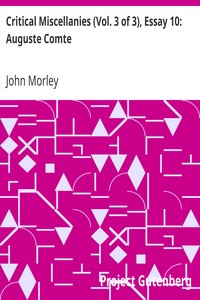Critical Miscellanies (Vol. 3 of 3), Essay 10: Auguste Comte by John Morley
"Critical Miscellanies (Vol. 3 of 3), Essay 10: Auguste Comte" by John Morley is an analytical essay written in the early 20th century that examines the life and contributions of the philosopher Auguste Comte. The work serves as a critical reflection on Comte's Positivism and his significant intellectual achievements during a transformative period in France. The essay provides insights into Comte's methodologies, social philosophies, and his attempts to reorganize society through scientific
principles, all of which mark a departure from traditional theological and metaphysical paradigms. In this essay, Morley delves into the influences that shaped Comte’s thought, notably his relationship with Saint Simon, as well as the intellectual challenges Comte faced throughout his life, including personal hardships and professional setbacks. The text elaborates on Comte's major works, particularly his "Positive Philosophy," detailing his ideas concerning the classification of sciences and the Law of the Three States. Morley critiques Comte's later attempts to establish a religion of humanity, highlighting the dualism between scientific inquiry and spiritual governance. Overall, the essay serves as both a tribute to and a critique of Comte's legacy, situating him within the broader discourse of modern philosophy and sociology. (This is an automatically generated summary.)
Read now or download (free!)
| Choose how to read this book | Url | Size | ||||
|---|---|---|---|---|---|---|
| Read online (web) | https://www.gutenberg.org/ebooks/29033.html.images | 109 kB | ||||
| EPUB3 (E-readers incl. Send-to-Kindle) | https://www.gutenberg.org/ebooks/29033.epub3.images | 136 kB | ||||
| EPUB (older E-readers) | https://www.gutenberg.org/ebooks/29033.epub.images | 136 kB | ||||
| EPUB (no images, older E-readers) | https://www.gutenberg.org/ebooks/29033.epub.noimages | 104 kB | ||||
| Kindle | https://www.gutenberg.org/ebooks/29033.kf8.images | 341 kB | ||||
| older Kindles | https://www.gutenberg.org/ebooks/29033.kindle.images | 329 kB | ||||
| Plain Text UTF-8 | https://www.gutenberg.org/ebooks/29033.txt.utf-8 | 96 kB | ||||
| Download HTML (zip) | https://www.gutenberg.org/cache/epub/29033/pg29033-h.zip | 135 kB | ||||
| There may be more files related to this item. | ||||||
Similar Books
About this eBook
| Author | Morley, John, 1838-1923 |
|---|---|
| Title | Critical Miscellanies (Vol. 3 of 3), Essay 10: Auguste Comte |
| Note | Reading ease score: 43.5 (College-level). Difficult to read. |
| Credits |
Produced by Paul Murray, Richard J. Shiffer and the Online Distributed Proofreading Team at https://www.pgdp.net |
| Language | English |
| LoC Class | B: Philosophy, Psychology, Religion |
| LoC Class | CT: History: Biography |
| Subject | Comte, Auguste, 1798-1857 |
| Category | Text |
| EBook-No. | 29033 |
| Release Date | Jun 4, 2009 |
| Most Recently Updated | Jan 5, 2021 |
| Copyright Status | Public domain in the USA. |
| Downloads | 127 downloads in the last 30 days. |
| Project Gutenberg eBooks are always free! | |

